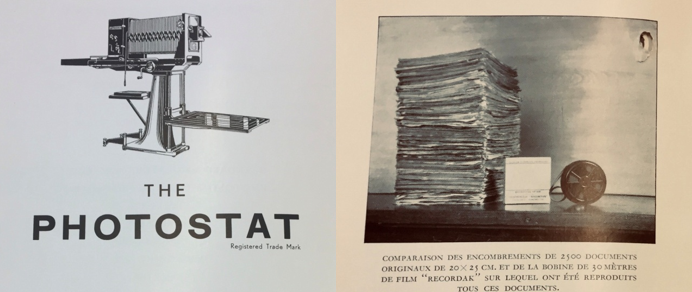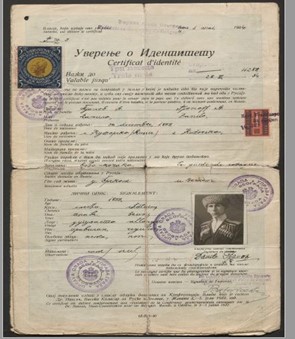Adriana Kolar, Ph.D., Archives Management Senior Analyst and Gudrun Beger, Ph.D, Archives Management Senior Analyst are both members of the ‘Total Digital Access to the League of Nations Archives (LONTAD) Project’.
Information Technology has taken a quantum leap since 1938, when Dr. Pieter Sevensma, Director of the League of Nations Library, ordered Photostat machines for the new premises of the organization, at the Palais des Nations in Geneva. Photostat machines were devices that made photographic copies of manuscripts, maps and documents. At the time, this system was not only state-of-the-art for making facsimiles but also for storing information on a medium other than paper, i.e., on film rolls.

Original documents from the League of Nations archives currently housed at the Library and Archives of the United Nations in Geneva – R5418/18B/19210/316
Fast-forward 80 years: in 2018, the process of scanning the entire League of Nations archives was launched, as part of the Total Digital Access to the League of Nations Project (LONTAD). Managed by the Institutional Memory Section of the United Nations Library & Archives Geneva, the aim of the project is to digitize the 15 million pages of content by 2022 (which will be roughly equivalent to 250 terabytes of data and nearly 30 million digital files).
At the Palais des Nations, analogue systems have long been replaced by sophisticated digital technology. For the LONTAD project, special overhead scanning machines, designed for cultural heritage (i2S CopiBook Open System), are being used. The main objective is to generate access copies with the widest possible use. Currently, two types of digital files are produced: a JPEG-2000 single page master file (300ppi, 24-bit color) and a multipage PDF file processed with Optical Character Recognition (OCR). Advanced technology and accurate metadata descriptions, which are ISAD(G) compliant, will help to overcome potential difficulties such as hand- and type-written documents, mimeograph text and different languages, and will ensure their accessibility. It is expected that over 500,000 units of descriptive metadata will be produced.
The LONTAD project will enable unhindered worldwide access to a unique collection of documents and will promote the study of early multilateralism. Up until now, most users were academics from Europe and North America. Thanks to the digitization, a more diversified public will have access to these records, and this will include civil society and the broader general public worldwide.
LONTAD harnesses technology not only for preservation purposes but also for increased accessibility to the archives, thereby unlocking and mobilizing the information and knowledge contained in its vaults. This expanded access can be utilized for finding solutions to the challenges of our world: from treaties, to multilateralism and cooperation, to climate change and refugee crises. For example, as the repository of an important collection concerning the early multilateral efforts to solve issues related to large numbers of refugees (the Nansen Fonds), the League of Nations archives is uniquely positioned as a starting point for further inspiration regarding possible answers to the global displacement crisis, in particular the transit of the stateless and refugees lacking proper travel documents.

League of Nations archives, Refugees Mixed Archival Group (Nansen Fonds) - C1548/444/20A/80182/80165
Today, civil society stakeholders have zeroed in on the ‘Nansen Passport’ as a model for a modern day ‘Passport’ to alleviate the plight of the millions of refugees stuck in their countries of asylum by allowing them to travel elsewhere for work and education purposes. Named after Fridtjof Nansen, the first High Commissioner for Refugees, the document (introduced in 1922) permitted hundreds of thousands of persons made stateless by conflict and the collapse of former empires to travel and work in a new country. The Nansen Fonds is made up of a total of 615 standard archival boxes (i.e. approximately 600,000 pages which have all been digitized), making it the largest collection on the history of international assistance to refugees in the world. And, as such, these exceptional archives could be used to illustrate and promote both past and present attempts to issue temporary travel IDs.
This is just an example of the potential impact that unhindered and worldwide access to the League of Nations archives could trigger. The list of topics and amount of knowledge which will be accessible is exceptional and ranges from intellectual collaboration, to collective security, health and economic questions. There is little doubt that this will have an impact on academic research and thus on political debates. Time will tell what the repercussions will be on policy-making. LONTAD is providing the world with a key to unlock a formidable potential by harnessing the power of the digits to turn knowledge into action for the common good.











































































































































Comments